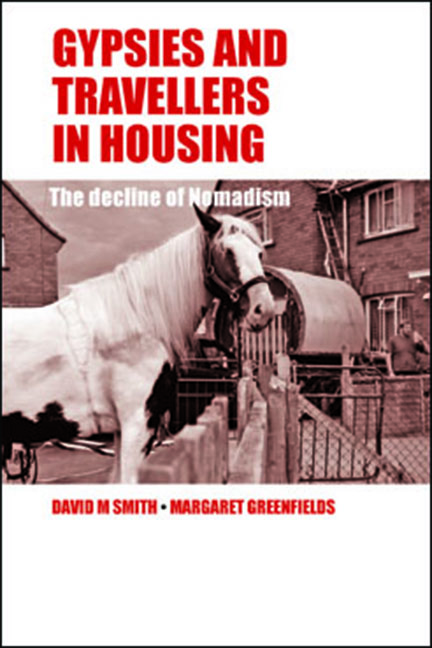Book contents
- Frontmatter
- Contents
- List of tables
- Acknowledgements
- Foreword
- one Introduction
- two Space, surveillance and modernity
- three Gypsies, nomads and urbanisation: a social history
- four The research sites and population sample
- five Routes into housing
- six Housing transitions
- seven Gypsies, Travellers and gorjers: conflict and cooperation
- eight Recreating community
- nine Young people in housing: aspirations, social relations and identity
- ten Conclusion
- Appendix A Methodologies
- Appendix B Glossary of words and terms
- References
- Index
Appendix B - Glossary of words and terms
Published online by Cambridge University Press: 03 February 2022
- Frontmatter
- Contents
- List of tables
- Acknowledgements
- Foreword
- one Introduction
- two Space, surveillance and modernity
- three Gypsies, nomads and urbanisation: a social history
- four The research sites and population sample
- five Routes into housing
- six Housing transitions
- seven Gypsies, Travellers and gorjers: conflict and cooperation
- eight Recreating community
- nine Young people in housing: aspirations, social relations and identity
- ten Conclusion
- Appendix A Methodologies
- Appendix B Glossary of words and terms
- References
- Index
Summary
Authorised site (also known as a ‘licensed site’)
A site which has planning permission for use as a Gypsy and Traveller site.
Cant/Gammon/Shelta
Cant is technically a form of Celtic language group which includes Gammon and Shelta languages used respectively by Irish and Scottish Travellers. Irish Travellers will often use the term ‘Cant’ interchangeably with ‘Gammon’, the specific language spoken within their community.
Caravan
Mobile accommodation consisting of kitchen area and bedrooms. Referred to as a trailer by many Gypsies and Travellers. (New Travellers may often live in converted trucks/buses/vans or other forms of living vehicles which fulfil the same function as a caravan.)
Chalet
Term used by Gypsies and Travellers, usually referring to a mobile home on a site, specifically a form of mobile home which resembles a bungalow.
Chavvy/chavvies
Romani word for ‘child/children’.
Cushti/cushy/kushti
Romani for ‘good’/something positive.
Divvy
Mad (“my cousin can be right divvy …”). Romani term.
Dukkering
Romani word for fortune-telling.
Fairs, or specifically named events such as ‘Appleby’ or ‘Stow’
Horse Fairs and associated cultural events dating back centuries attended by large numbers of Gypsies and Travellers to trade animals, meet friends and relatives; buy and sell and meet potential marriage partners. Of huge cultural significance, and for many sedentarised Gypsies and Travellers the only times in the year when they ‘travel’ or live in a trailer.
Family site
A private caravan site owned and occupied by an (extended) family. Broadly equivalent to owner-occupation in mainstream housing.
Gavver
Romany word used by Gypsies/Travellers to refer to the police.
Gorje/Gorgio/Gorge/Gaujo/Gadje/Gaje – ‘Settled community’/Country People/Flatties
‘Gorjer’ (spelt in a variety of different ways) is a Romani term used by Gypsies to describe all non-Gypsies and Travellers.
‘Settled community’ is a term used by Gypsies and Travellers to describe people who are not Gypsy or Traveller by ethnicity or culture and who live in bricks and mortar housing.
‘Country People’/‘Flatties’ are the Irish Traveller equivalents of the ‘gorjer’ and refer to non-Travellers resident in housing.
Gypsies/Travellers (statutory definition – 2004 Housing Act)
The Housing (Assessment of Accommodation Needs) (Meaning of Gypsies and Travellers) (England) Regulations 2006 (Statutory Instrument 3190/2006) were implemented in order to resolve the definition of Gypsies and Travellers in relation to the duties under the Housing Act 2004.
Information
- Type
- Chapter
- Information
- Gypsies and Travellers in HousingThe Decline of Nomadism, pp. 213 - 220Publisher: Bristol University PressPrint publication year: 2013
